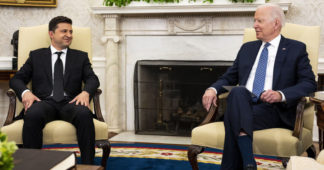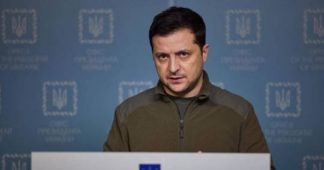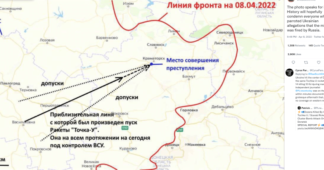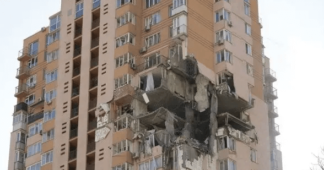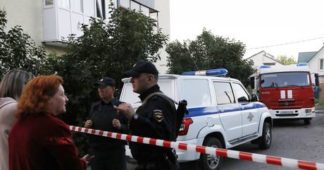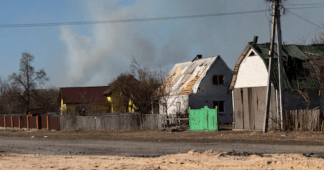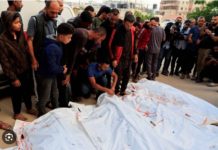Update on the situation in Ukraine: January 2023
By Dmitriy Kovalevich,
Feb 3, 2023
Dmitriy Kovalevich is the New Cold War’s special correspondent in Ukraine. He writes a monthly update as well as special reports for the NCW website. In this report Dmitriy Kovalevich examines the situation in the Donbass region, the various reports coming from Ukraine officials and the media, and the serious losses among the Ukraine forces in the area. He also sets out the evidence of people being directly conscripted (kidnapped) from the street and taken to the frontlines.
__________________________
The first month of 2023 in Ukraine was marked by the defeat of Ukrainian troops near Soledar, the ‘meat grinder’ village in the Donbass region, located near the strategic, small city of Artyomovsk (called ‘Bakhmut’ in Ukraine, per-war population 75,000). Ukraine has suffered heavy losses in fighting around the city in January. It is continuing with the capture and forced conscription of young men on the streets of its towns and cities to compensate for its large military losses in Bakhmut.
Fierce fighting has taken place in and around Soledar in the Donetsk region since the middle of last year. The town, whose pre-war population was around 10,000, was practically destroyed in the fighting and became a huge grave for Ukrainian soldiers. It was stormed mainly by Russian units recruited from among prisoner volunteers. Their criminal records were expunged in exchange for six months of military service.
Kyiv recognized the loss of Soledar only two weeks after the fact. It has stopped mentioning the town altogether in its reports. The largest salt mines in Ukraine are located in and around the town. With the loss of the town, even products such as salt are now beginning to be imported to Ukraine, mainly from Poland.
Aleksey Arestovich, an adviser to the office of the Ukrainian president, said in January that many Ukrainian soldiers could not withstand the Russian onslaught against Soledar and fled. According to him, during the entire defense of the city there were “a substantial number” of refuseniks who declared they “cannot fight any longer in this terrible war”. Arestovich said, “We have people who refused to dig trenches, and when they were led into ready-made trenches, they just stood still. Many said the enemy (Russian soldiers) were too close and it was better to move several miles back from the front lines.”
This and other revelations by Arestovich caused a flurry of criticism from Ukrainian nationalists. At the end of January, a missile hit a residential building in Dnieper (Dnipro) city and killed 46 civilians. Arestovich admitted that a Russian missile was hit by a Ukrainian air defense missile and fell on a residential building, causing the injuries. After this confession, the Ukrainian parliament began collecting signatures calling for Arestovich to resign. Within several days, he announced he was resigning, but not before his revelations had once again exposed the falsehoods routinely contained in the official statements of the Ministry of Defense of Ukraine.
For its part, Russia said the missile shot down over Dnieper was aimed at military installations and repeated that it does not target civilians in Ukraine.
The battle for Soledar also showed the eroding motivation of military personnel in Ukraine. Many of those being forcibly mobilized are showing no desire to fight. In mid-January, the Ukrainian media published a video in which Sgt. Igor Bondarenko, deputy platoon commander of the 60th brigade, berates his subordinate Ukrainian soldiers who had taken refuge in a residential building and were unwilling to fight. The video was filmed for the purpose of reporting to a higher command, which demands that military recruits be driven into battle by all necessary means.
The German magazine Der Spiegel, referring to German intelligence information, reported at the end of January that in and around Bakhmut alone, Ukraine was seeing hundreds of its soldiers killed every day. The Ukrainian Telegram channel ‘XUA-photo of the war’ has broadcast terrible film footage demonstrating the extent of deaths among the Armed Forces of Ukraine in the area. It comments, “Of course, the full scale of this tragedy needs to be documented in the future. On the front lines of Bakhmut-Soledar, the Ukrainian military command has displayed complete failure. There are huge numbers of deaths among the manpower of the Armed Forces of Ukraine.”
In order to try and hold Soledar and Bakhmut, Kyiv transferred military units from other directions. As a result, at the end of January, Russian troops went on the offensive in the Zaporozhye direction, crushing the first line of defense of the Armed Forces of Ukraine and capturing many prisoners of war.
The Russian army, as before, uses the tactics of long-range artillery followed by assault groups entering the destroyed positions. If significant pockets of resistance still remain, retreats followed by more artillery strikes take place. As Russian military correspondent German Kulikovsky writes on Telegram, “We do not take high losses in our offensives, or even in our defensive postures. This explains, by the way, the slow pace of our offensives. Surely, old-school generals are sad that it is not possible to send 10,000 soldiers out in dashing attacks and then, having lost some 30% or whatever, report success to the top-command. For today’s good divisional commanders, everything is completely different. They take care of people, actively using military deceptions, as needed.”
This is actually what is taking place today at front-line positions. Russian forces advance in relatively small assault groups on clearly selected targets – Soledar, Bakhmut, Maryinka, Avdeevka, Kremennaya. At the same time, missile strikes against the energy infrastructure of Ukraine are taking place, increasing the cost and the complications for the U.S. and European allies of Ukraine engaged in combat.
At the same time, the Russian Armed Forces have reserves concentrated in all sectors of the front, ready to stop a large offensive of the Armed Forces of Ukraine if such can be organized at all. If this scenario holds, then the Armed Forces of Ukraine will continue to be squeezed out of the Donetsk republic while a shift to Zaporozhye region takes place. The main idea here is to achieve psychological exhaustion of Ukrainian forces and its Western allies and implant an understanding that a prolonged war will only cause greater costs to Ukraine and produce a peace on much worse terms than Ukraine might otherwise be able to negotiate.
Most of the Zaporozhye region is already under Russian control, but the city of Zaporozhye (population 750,000, fifth largest in Ukraine) as well as a large stretch of the east bank of the Dnieper River remain under Ukrainian control.
Pentagon chief Lloyd Austin told a meeting of NATO-country war ministers at the U.S. Air Force base in Ramstein, Germany at the end of January that a crucial moment in the fighting in Ukraine had arrived and Russia was gathering strength.
Almost the same thing was said by NATO Secretary General Stoltenburg at the meeting of global elites several days earlier in Davos, Switzerland. “This is a pivotal moment in the war and there is need for a significant increase in support for Ukraine. If we want a negotiated peaceful solution tomorrow, we need to provide more weapons today,” he said.
Russian military experts are once again noticing that Western media and politicians are constantly talking about “crucial moments” and “imminent turning points” in Ukraine. Russians note with some surprise that not only Ukraine’s opponents but also their supporters in the West are constantly talking about ‘turning points’ being reached. Ukrainian politicians are also using this language, though in their case, they hope that all their previous words about impending victories over Russia are quietly forgotten. Past ‘turning points’ were talked about in March, April, May, September and December of 2022…
Russian analysts conclude that the dependence of Western politicians on the media relaying of messaging and on classical, capitalist economic belief is turning them into something resembling stock market players or actors in a Hollywood blockbuster film, obsessed with big and conclusive endings. For these analysts, the preoccupation with ‘tipping points’ suggests that a prolonged conflict and the long-term costs of supplying and maintaining weapons to Ukraine from NATO countries will not last long. They see the West actively pressuring Kyiv to send more military recruits to the slaughter in order to achieve a ‘tipping point’ as quickly as possible. In contrast, Russian tactics involved orderly entries or exits from selected territories designed to wear down the Ukrainian army and economy while maintaining main forces in reserve in case of a major conflict with NATO in the future.
Against the backdrop of its serious losses, military conscription has intensified throughout Ukraine. Sometimes, it resembles the straightforward kidnapping of men of military age. Military commissars are increasingly trying to hand out summonses in the most unlikely and inappropriate places (albeit fully permitted legally), such as entrances to shops, in parking lots or at gas stations. Sometimes they resort to roadblocks.
In Odessa, there have been cases of people being directly conscripted (kidnapped) from the street. A subscriber of the ‘Typical Odessa’ channel on Telegram reported, “This morning, my friend, near the railway station, was put into a car and taken to the military registration and enlistment office, without even being presented a written summons. He passed a medical examination at half past six in the evening and was then told he is being sent to Nikolaev. Apparently, this is a new tactic. Authorities realize that no one is reacting to military summonses, and so they have begun to take people and deliver them right to the frontline.”
Other subscribers from Odessa comment that men are brought to the military enlistment offices by ambulances and ‘Nova Poshta’ (delivery service) vehicles. Military commissars often go about their work in civilian clothes. Not everyone surrenders without a fight. “Near Kulikovo field (a neighborhood in central Odessa) in the courtyard of a nine-story building, two unknown people put up serious physical resistance to two “messengers of death” (as military conscription officers are called), as a result of which the young civilian men prevailed and the losing ‘military’ side lost their package of documents and money,” writes ‘Typical Odessa’.
The director of the Institute for the Study of the Consequences of Military Actions in Ukraine, Russian political scientist Kirill Molchanov, calls Ukraine a “kamikaze state”. He emphasizes that there exists another Ukraine, which is represented by refugees and residents in the south of Ukraine who are attending protest rallies organized by the wives and mothers of servicemen. According to him, these are the people who voted for Zelensky in 2019 because of his promise to end the nationalist dictatorship and the war in Donbass of his predecessor, Petro Poroshenko. (Poroshenko was elected in May 2014 as the suppression of opposition to the coup of February 2014 was already well advanced.) Molchanov argues that, “In order to get away from the Western-imposed role of Ukraine as a kamikaze state, a platform is needed to find consensus and develop a common vision for Ukrainians who disagree with Kyiv’s current course.”
The former commander of Polish Land Forces, reserve Colonel-General Waldemar Skrzypczak, gave an interview on January 16 to the pro-government Polish outlet wPolityce on the prospects for ending the armed conflict on the territory of Ukraine. According to the Polish general, the president of the Russian Federation is convinced that if Russia succeeds in expelling Ukrainian forces from the Donbass region, Ukraine will not be able to survive economically and will revert to being an exclusively agrarian country. “Unfortunately, Russia will get its way, because now it is increasing its advantage. The key to its success will be what it is doing now – preparing for a full-scale war in which Russia will have the advantage of several times superiority over the Ukrainian army. The Russians will achieve this, and, unfortunately for Ukraine, there is no point in disputing this,” said the general.
According to the Polish military, the West is not able to help Ukraine enough to create a military potential superior to Russia’s. Skrzypczak believes that Russia can only be strangled politically and economically. “Where are we going? Are we betting that all Ukrainians will die in this war?” he asked rhetorically. He answered himself in the affirmative, calling for the mobilization of those Ukrainians residing in Western countries who managed to escape military service in Ukraine. When asked by a journalist that Ukrainians in the West probably do not want to fight, the general replied that their opinions do not matter. “Ah, so now we are going to ask them if they want to be soldiers or not? It is necessary to mobilize, draft into the army – and that’s all,” said the Polish general.
The real reasons for such interest in the fact that “all Ukrainians die in this war” was unequivocally explained by Canadian finance minister Chrystia Freeland at a gathering of the richest people of the world in Davos, Switzerland. Her maternal grandfather edited a pro-Nazi, Ukrainian newspaper out of Vienna during the Nazi German occupation of Ukraine. According to her, Ukrainians are fighting for the interests of Western countries, and the defeat of the Russian Federation will lead to a boost in the global economy.
Boosting the world economy for the benefit of the super-rich gathered or represented in Davos will mean, first of all, an increase in their personal profits and, secondly, the acquisition of the resources of the Russian Federation through a new military crusade. After all, even the head of the IMF told the assembled faithful in Davos in January that the conflict in Ukraine is global, not regional. For the sake of this, hundreds of Ukrainians are dying every day in and around Bakhmut, and such losses are being replaced by forceful kidnappings on the streets of Ukraine.
We remind our readers that publication of articles on our site does not mean that we agree with what is written. Our policy is to publish anything which we consider of interest, so as to assist our readers in forming their opinions. Sometimes we even publish articles with which we totally disagree, since we believe it is important for our readers to be informed on as wide a spectrum of views as possible.
